Finland formally joined NATO on Tuesday, unfurling its flag outside the military bloc’s Brussels headquarters. It was a historic policy shift brought on by Russia’s invasion of Ukraine that prompted threats of “countermeasures” from Moscow.
Finland’s entry roughly doubles the length of NATO’s border with Russia and strengthens NATO’s eastern flank as the war in Ukraine continues with no resolution in sight.
Finnish Foreign Minister Pekka Haavisto handed over a formal document to US Secretary of State Anthony Blinken at NATO headquarters, completing the accession process.
Finland’s flag, a blue cross on a white background, was hoisted along with those of the 30 other members of the federation, and a military band played in bright sunshine.
“For nearly 75 years, this great alliance has protected our nation and continues to do so today,” NATO Secretary-General Jens Stoltenberg announced at the ceremony. “But the war returned to Europe, and Finland decided to join NATO and become part of the most successful alliance in the world.”
Stoltenberg earlier pointed out that Russian President Vladimir Putin cited opposition to NATO’s eastward expansion as one of the reasons for invading Ukraine.
“He has the opposite in Finland today, and Sweden will soon be a full member of the alliance as well,” Stoltenberg said in Brussels.
Finnish President Saul Niinisto said Finland’s most important contribution to NATO’s common deterrence and defence is to defend its own territory. He said that much work remains to be done to coordinate this with NATO.
“It’s a great day for Finland, and I would say it’s also a big day for NATO,” Niinistö told a joint news conference with Stoltenberg.
The Kremlin said Russia would be forced to take “countermeasures” against Finland’s accession. Defence Minister Sergei Shoigu said the move raised the possibility of a further escalation of the conflict in Ukraine.
Russia said on Monday it would strengthen its military capabilities in the west and north-west in response to Finland joining NATO.
The Ukrainian government also welcomed Finland’s move. “FI made the right choice. NATO is also a key target for Ukraine,” Andrey Yermak, President Zelenskiy’s chief of staff, wrote in a telegram.
The event marked the end of Finland’s era of military non-alignment, which began when the country repelled the Soviet invasion attempted during World War II and opted to try to maintain friendly relations with neighbouring Russia.
But the February 2022 invasion of Ukraine prompted the Finns to seek security under NATO’s collective defence agreement, which states that an attack on one member is an attack on all members.
Moscow, which has long criticised the move, was not quick to react.
Kremlin spokesman Dmitry Peskov said the NATO expansion was “a violation of our security and Russia’s national interests”. He said Moscow would closely monitor any NATO military deployment in Finland.
Since the end of the Cold War three decades ago, Moscow has watched with horror successive waves of NATO’s eastward expansion into formerly communist Eastern Europe, an issue that had become a bone of contention even before the invasion of Ukraine.
NATO has repeatedly stressed that it is only a defensive alliance and does not threaten Russia. Moscow says NATO countries have sent heavy weapons to Ukraine since the start of the war as evidence of the West’s determination to destroy Russia.
Finland’s entry brings to NATO a significant military capability it has developed over the years. It is one of the few European nations to retain a conscripted force during decades of peacetime, wary of neighbouring Russia. In addition, Finland’s ground, naval and air forces are trained and equipped with the primary objective of repelling any Russian attack.
On their way to work on Tuesday, Helsinki residents welcomed Finland’s NATO membership, saying they felt more secure.
People in the Russian city of St Petersburg, just 150 kilometres (93 miles) from the Finnish border, say Finland could get itself into trouble by joining NATO.
Finland and its Nordic neighbour Sweden jointly applied to join NATO last year, but Sweden’s application was held up by NATO members Turkey and Hungary.
Swedish Foreign Minister Tobias Bilstrom told reporters that Stockholm had ambitions to become a member at the NATO summit in Vilnius in July.
Turkey says Stockholm harbours members of what Ankara considers a terrorist group, a charge Sweden denies and has demanded their extradition as a step toward granting Sweden accession.
Hungary criticised Prime Minister Viktor Orban’s record on democracy and the rule of law.







